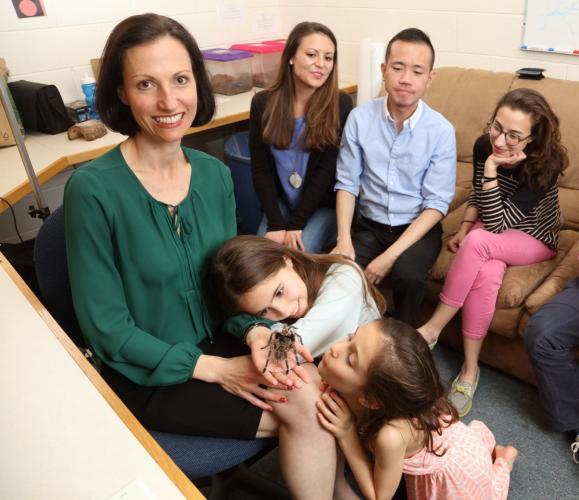- Undergraduate
- Graduate
- Research
- People
- Connect
Clinical Psychology

The PhD Program in Clinical Psychology will recruit a cohort for the 2025-2026 academic year. The following faculty are hoping to admit students to enter Fall 2026: Noelle Hurd, Stefanie Sequeira, and Bethany Teachman.
Faculty members in the Clinical Training Program are committed to the clinical scientist model of training, with a clear emphasis on the word "scientist." We also emphasize the development of strong evidence-based clinical skills as an essential part of our training, and seek to train students who are fully capable of and interested in integrating science and practice.
The program requires a minimum of five years of full-time study -- four years plus a full year internship. The curriculum has been designed to ensure students' active participation in clinical research as well as complementary experience with the assessment and treatment of clinical problems throughout their programs of study. Our clinical training program is designed to provide students with the broad skill set needed to offer the most widely-used and research-supported assessment and therapy approaches for working with clinical problems, as well as problems in living and relationships. The training sequence includes theoretical and applied training in how to provide therapy for adults, children, families and couples. The clinical faculty has practice expertise across a variety of different theoretical orientations (e.g., cognitive-behavioral, interpersonal, psychodynamic), recognizing that not all problems or clients respond to a single type of therapy. Thus, students are trained to use an individual case conceptualization along with the research literature to guide the choice of therapy approach for a given client.
We do not believe that our students need to choose between being scientists or practitioners; they must see these activities as being inherently intertwined, and they must be able to function in both roles. We emphasize research and academic career goals for our students consistent with our training goals. However, a number of students elect careers in applied settings and use their clinical scientist skills in clinical, administrative or policy work.
This program is accredited by the American Psychological Association and also by the Psychological Clinical Science Accreditation System (PCSAS) through 2033. It is aimed at a select group of students: those who believe that clinical psychology should be firmly grounded in the basic science of our field. The Clinical Training Program is a member of The Academy of Psychological Clinical Science, which is a coalition of doctoral training programs that share a common goal of producing and applying scientific knowledge to the assessment, understanding, and amelioration of human problems.
In accordance with the CUDCP, we have provided a Full Disclosure Data Page for the clinical graduate program in the Department of Psychology.
Student Admissions, Outcomes, and Other Data: Description of recent experiences of students in the clinical program, including internship application success rates, time in the program and funding expectations. (Document is presented in format mandated by APA)
For prospective applicants: Is a PhD in clinical psychology the right choice for you?
More information about clinical psychology and application tips can also be found at https://clinicalpsychgradschool.org/positions/, and see great graduate school advice from Dr. Mitch Prinstein.
To learn more about what makes an applicant competitive, read CUDCP's Preferred Predoctoral Competencies for Clinical Psychology.
CUDCP's Policy for Admissions Offers and Acceptances
Questions related to the program's accredited status should be directed to:
American Psychological Association (APA)
Office of Program Consultation and Accreditation
750 1st Street, NE, Washington, DC 20002
Phone: (202) 336-5979 / Email: apaaccred@apa.org
Web: www.apa.org/ed/accreditation
OR
Psychological Clinical Science Accreditation System (PCSAS)
Joseph E. Steinmetz, Ph.D., Executive Director
1101 E 10th Street, Bloomington, IN 47401
Email: jsteinmetz@pcsas.org
Phone: 479-301-8008
Web: www.pcsas.org/
Please note:
The application for the PhD programs in the Department of Psychology has eliminated the GRE requirement, beginning with the applications for the 2021 admissions.
PUBLIC PROFESSIONAL LICENSURE DISCLOSURE
As a member of the State Authorizations Reciprocity Agreement, the University of Virginia (UVA) is authorized to provide curriculum in a distance learning environment to students located in all states in the United States except for California. (34 CFR 668.43(a)(6)& 34 CFR 668.72(n)).
Upon completion of the Doctor of Philosophy in Psychology at the UVA Graduate School of Arts and Sciences, graduates may be eligible for professional licensure in another U.S. state by applying to the licensing board or agency in that state.
Please visit the University’s state authorization web pages to make an informed decision regarding which states’ educational requirements for initial licensure are met by this program. (668.43(a)(5) (v)(A) - (C))
Enrolled students who change their current (or mailing) address to a state other than Virginia should update this information immediately in the Student Information System as it may impact their ability to complete internship, practicum, or clinical hours, use Title IV funds, or meet licensure or certification requirements in the new state. (34 CFR 668.402).
Note. On the university's state authorization web pages, we focus on the pre-internship licensure requirements for all states. This is because a predoctoral internship is required to meet licensure requirements and the internship is not offered through the UVA doctoral program. Instead, our students participate in the internship match program through the Association of Psychology Postdoctoral and Internship Centers (as is standard practice for the vast majority of doctoral programs). To learn more about our internship match and licensure rates, please see our program's Student Admissions, Outcomes, and Other Data linked here.